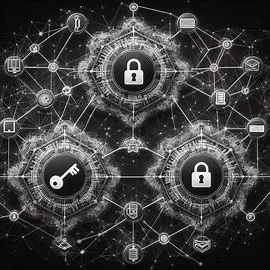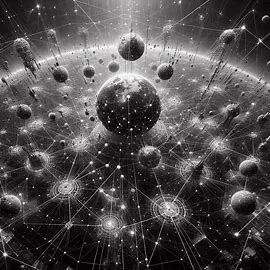quotingTHE DIALECTICS OF NOSTR
note1nwy…ex58
A summary of the dialectical ontology underlying this small yet significant essay by G. Brander: "Nature's many attempts to evolve a Nostr": https://newsletter.squishy.computer/p/natures-many-attempts-to-evolve-a.
It seems that @fiatjaf has found a new way to deal with the space of possibilities (logical space) in the evolutionary dispute between protocols. In other words, a new way to advance through what I call Leibniz's quadrants¹ and perhaps gain a few good steps ahead of the competition.
Let's see.
Three Movements in Protocol Evolution
1. First Movement: Centralization
Everything begins with the tendency towards a certain (sometimes great) degree of centralization inherent in the formation process of these complex natural networks in which we are immersed. Networks of atoms (molecules), networks of organic molecules (living beings), network of living beings (ecosystems), network of people (societies) - and also networks of information processing and distribution tools: the vast internet, our topic at hand.
1.1. Maximum Centralization
(In the logical-dialectical space (read the post below), at the top of Parmenides' quadrant, maximum predominance of the One over the Many: +O/-M (stage 1))
Advantages (and the major disadvantage) of centralization: stability (at least initially), order, concentration of power (massive control of cryptographic keys and user data) and money to generate more power and money and grow further, while at the same time each new degree of centralization implies one more degree in increasing the risk of systemic collapse (the collapse of a single network node, in this case the central node, is enough for everything to come crashing down), that is, an increase in the fragility of the system.
Examples of Centralized Control:
a) Dictatorship;
b) Facebook.

2. Second Movement: Decentralization
2.1 Initial Decentralization
A still mild version of decentralization: in logical space, still in Parmenides' quadrant (+O/-M (stage 2)), but almost entering Leibniz's quadrants (the inferior quadrants).
Decentralization provides more flexibility and resilience to shocks (random or intentional).
Examples:
a) Oligopoly;
b) Federation: email, Mastodon.

2.2 Enhanced Decentralization
Examples:
a) Anarchism (anomie);
b) P2P.

In its extreme forms, more of a concept than a reality, since structures of maximum decentralization or maximum predominance of the Many over the One (-O/+M) are inherently unstable. The maximum predominance of the Many and its characteristics (difference, variation, underdetermination) over the One and its characteristics (identity, invariance, determination) implies maximum disorder or chaos.
3. Mesotês
The dynamic equilibrium between centralization and decentralization (exploration of Leibniz's quadrants (+O/+M) in logical space)
This is the new possibility explored by Nostr, according to the aforementioned essay. User control of cryptographic keys (the decentralization aspect of Nostr), acceptance of some degree of centralization in servers (relays) which, on the other hand, are dynamic, not static central nodes², as their power is continuously challenged and limited by user autonomy (who can change relays at any time).

When I see this, I immediately wonder if there might be a similar response to the current impasses surrounding the centralization of political power in our countries. I believe there must be some answer, in some corner of the logical space, and someone will yet discover it, and we will have not only more sustainable long-term decentralization of power, but with it, we will all have a broader space of freedom.
¹ Brander references network theory. In another context, I demonstrated the fruitful relationship between network theory and dialectical ontology:
https://www.academia.edu/20228035/Dialectic_and_Network_Ontology_The_Concept_of_Reason_after_Hegel_2014_
² The problem (ontological and ethical) is not centralization, but extreme & static centralization (the crystallization of power in corporations or governments).
NOTE1: The images above are all created by AI (copilot) (the reader can check the images used by Brander himself in his aforementioned essay).
NOTE2: More about logical space in dialectics here:
👇
nevent1q…cvlf
Ideia da Coerência on Nostr: Republiquei esta versão em inglês da postagem sobre o Nostr, já com as novas fotos ...
Republiquei esta versão em inglês da postagem sobre o Nostr, já com as novas fotos e pequenos aprimoramentos no texto, em homenagem aos 4 anos do protocolo.
